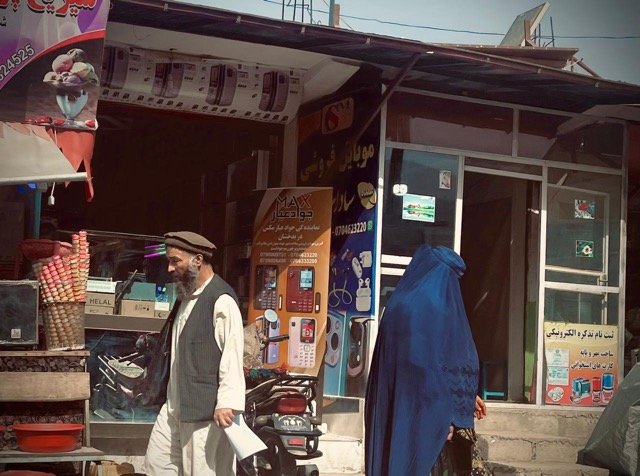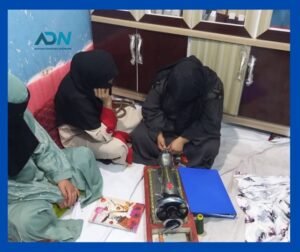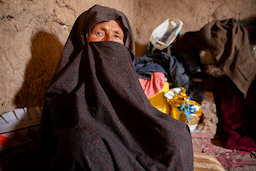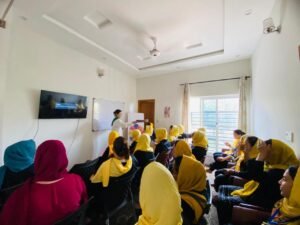From Discrimination to Apartheid: Reframing Gender Persecution in Afghanistan

North-eastern Afghanistan. Photo by @AADIL for ADN
By Ali Ahmad
‘Afghanistan is the only country in the world where girls are completely banned from education beyond grade 6. For the past three and a half years, the Taliban has ripped away the right to learn from every Afghan girl. They want to eliminate women and girls from every aspect of public life and erase them from society. They have created a system of gender apartheid’ (Malala Yousafzai, Nobel Peace Prize Laureate).
Since August 2021 and in response to the Taliban’s misogynistic system, Afghan women have set up campaigns and engaged in transnational advocacy networks to advocate for the recognition of gender-based persecution and discrimination as gender apartheid. The common aim of these campaigns is to provide victims and survivors of gender apartheid with a legal framework to hold the Taliban accountable as perpetrators under international law.
In March 2023, a group of Afghan and Iranian women launched the End Gender Apartheid campaign, which advocates for the recognition of gender apartheid as a crime against humanity under international law. The campaign is endorsed by prominent Afghan and Iranian women activists, human rights defenders, and Nobel Peace Prize laureate Shirin Ebadi.
A second campaign, End Gender Apartheid in Afghanistan, is led primarily by the Afghan Hazara community in the United Kingdom and is similar to the first but focuses solely on Afghanistan. This campaign aims to promote international solidarity and urge governments and international organisations to take decisive action.
Recommendations
- Push for the offence of gender apartheid to be included in a draft of the UN Convention on the Prevention and Punishment of Crimes against Humanity.
- Advocate for the recognition of gender apartheid as a crime against humanity under international law and call for the expansion of the Rome Statute of the International Criminal Court to include gender apartheid as a prosecutable offence. (Page 2/C)
- Support efforts to hold Afghanistan accountable for violations of the UN Convention on the Elimination of all Forms of Discrimination Against Women (CEDAW). (Page 3/E)
- A refusal to recognise the Taliban regime as long as women and girls are excluded from the most basic rights, such as education, employment and healthcare. These rights should be insisted on in all negotiations and talks with the Taliban, even if the issues under discussion are, for example, migration and readmission.
- Granting protection to all Afghan women and girls in alignment with the 4 October 2024 ruling by the Court of Justice of the European Union (CJEU). (Page 3/F)
- The international community and the Austrian government should work to prioritise the provision of humanitarian aid and assistance to women and girls in Afghanistan and provide humanitarian and development aid only if they ensure that it reaches vulnerable women and families.
What Is Gender Apartheid?
The United Nations International Convention on the Suppression and Punishment of the Crime of Apartheid was adopted by the General Assembly on 30 November 1973, thereby declaring apartheid an international crime against humanity. The term apartheid, which originates from the South African context, means ‘apartness’ or ‘separation’ and refers to the systematic segregation of whites and non-white racial groups through systematic political and economic discrimination. In South Africa, this system, which remained in force from 1948 to 1990, categorised the population into eight different ‘races’ based on external characteristics and was characterised by an authoritarian, self-declared supremacy of the white, European-descended population group.
Under the Taliban, a similar form of segregation exists but along gender lines rather than race. The Afghan women in the gender apartheid campaigns argue that if ‘gender’ is substituted for ‘racial group’, it fits the situation of Afghan women because there is a clear segregation of men and women in every facet of their lives under the Taliban. This form of apartheid is implemented with the intention of dominating women and depriving them of all rights. Gender apartheid thus refers to a system of governance that enforces the systematic separation of men and women through laws and policies that exclude women and girls from public spaces and roles. In essence, gender apartheid denies women and girls their fundamental humanity by subjecting every aspect of their existence to strict control and surveillance.
What Does the Codification of Gender Apartheid in International Law Achieve?
The inclusion of gender apartheid in the Convention on the Prevention and Punishment of Crimes against Humanity, currently under consideration by the United Nations General Assembly, would establish a legal basis for holding perpetrators accountable and protecting the human dignity of women and girls. If adopted, it would require member states to criminalise gender apartheid in their domestic laws and to take measures to prevent, punish and cease such acts. Such recognition would provide victims and survivors with a clear legal pathway to holding both state and individual perpetrators accountable. Violations by member states could be addressed through interstate dispute settlement mechanisms and could potentially lead to proceedings at the International Court of Justice.
Acknowledging gender apartheid as a distinct legal category creates an international accountability mechanism. If the term is codified in international legal frameworks, governments and international organisations will face greater pressure to take concrete policy actions, including sanctioning Taliban leaders, restricting diplomatic engagement and supporting legal procedures against the Taliban. The legal recognition of gender apartheid will enhance advocacy efforts by international bodies and human rights organisations, thus ensuring that gender apartheid is not framed merely as discrimination but treated as a serious international crime that requires urgent action.
Progress in Policy and Legal Action Progress between 2023 and 2025
- The UN Women Executive Director: In September 2023, UN Women Executive Director Sima Bahous spoke to the UN Secretary Council meeting on the situation in Afghanistan. She called on the UN Security Council member states to support ‘an intergovernmental process to explicitly codify gender apartheid in international law’.
- The UN Special Rapporteur: In June 2023, Richard Bennett, the UN Special Rapporteur on the human rights situation in Afghanistan and the UN Working Group on discrimination against women and girls, described the situation for women and girls in Afghanistan as gender apartheid. One year later, in June 2024, Bennett reaffirmed that the ‘institutionalised system of domination and oppression of women and girls in Afghanistan should propel the discussion of codification of the crime of gender apartheid forward’, thereby recognising the crimes against humanity treaty as a potential avenue for codification.
- Austrian Member of Parliament: On 15 May 2024, Petra Bayr MP introduced a resolution to the Austrian National Council regarding the initiative to expand the Rome Statute to prohibit gender-based apartheid: ‘The national government, in particular the Minister for European and International Affairs, the Minister of Justice and the Minister for Women, Family, Integration and Media in the Office of the Chancellor are called upon to emphatically advocate for an expansion of the Rome Statute of the International Criminal Court so that gender-based apartheid can be prosecuted as a separate criminal offence within the context of crimes against humanity’.
- European Union (EU) Parliament: On 19 September 2024, the EU Parliament adopted a resolution on human rights issues in Afghanistan, in which the EU Parliament condemned Taliban decrees that erase Afghan women from public life. Members of Parliament called on the EU to support the recognition of gender apartheid as a crime against humanity, demanded sanctions against the Taliban and held the Taliban accountable through the International Criminal Court (ICC).
- International Court of Justice (ICJ): On 25 September 2024, in a groundbreaking move, Canada, Australia, Germany and the Netherlands announced that they would take formal steps to take Afghanistan to the ICJ over gross violation of women’s rights by the Taliban. The case was filed under CEDAW, which Afghanistan ratified in 2003. The next day, twenty-two more states joined the initial four in condemning gender-based discrimination against women and girls in Afghanistan. This marks the first time that at least one country has taken another to the ICJ for violation of CEDAW and gender persecution.
- CJEU: On 4 October 2024, the CJEU ruled that systemic discrimination, such as that faced by Afghan women under the Taliban’s rule, amounts to persecution under EU asylum law. The judgment, prompted by requests for a preliminary ruling by the Austrian Supreme Administrative Court, affirms that taken cumulatively, the lack of protection from gender-based and domestic violence and forced marriage, along with forced veiling and restrictions on education, employment, healthcare, movement and political participation, violates human dignity. The CJEU clarified that asylum authorities need not consider other factors regarding an applicant’s individual status besides her gender and nationality when assessing whether the accumulation of discriminatory measures amounts to persecution, thus strengthening Afghan women’s right to international protection.
- ICC: On 23 January 2025, the ICC prosecutor filed an application for arrest warrants against Taliban leader Hibatullah Akhundzada and the group’s chief justice, Abdul Hakim Haqqani, as the individuals principally and ‘criminally responsible for persecuting Afghan girls and women’ in Afghanistan. Such persecution, which occurred from at least 15 August 2021 to 20 January 2025, targets girls, women and individuals whom the Taliban perceives as failing to conform to their ideological expectations of gender identity. It remains to be seen whether ICC judges will issue arrest warrants.
Background
Since returning to power in August 2021 and establishing its Islamic Emirate, the Taliban has enforced a system of gender apartheid. They have introduced sweeping governance changes that disproportionately restrict women’s freedoms and dismantled Afghanistan’s 2004 Constitution, abolishing all legal bodies that formerly promoted gender equality. One of the Taliban’s first restrictive measures was the replacement of the Ministry of Women’s Affairs – a body that empowered women – with the Ministry of Propagation of Virtue and the Prevention of Vice, an institution dedicated to enforcing a strict interpretation of Shari’a law. Furthermore, the Taliban dismantled the Afghanistan Independent Human Rights Commission, which had previously provided crucial support to Afghans facing human rights violations. Through these measures, the Taliban has institutionalised the systematic persecution of Afghan women and girls based on gender.
In July 2024, the policy of persecuting women and girls, which had previously been enforced through decrees and directives, was enshrined in the Morality Law for the Promotion of Virtue and Prevention of Vice, which was ratified by the Supreme Leader of Afghanistan Hibatullah Akhundzada and published in the Taliban’s Ministry of Justice gazette. This law institutionalised the oppression of Afghan women and girls and created a deep divide between men and women. Every aspect of women’s and girls’ lives is now controlled and restricted by regulations.
Further Reading
Bahous, Sima. 2023. ‘Speech: The Women’s Rights Crisis: Listen to, Invest in, Include, and Support Afghan Women’. UN Women, 26 September. https://www.unwomen.org/en/news-stories/speech/2023/09/speech-the-womens-rights-crisis-listen-to-invest-in-include-and-support-afghan-women.
Bennoune, Karima. 2022. ‘The International Obligation to Counter Gender Apartheid in Afghanistan.’ Columbia Human Rights Law Review.
Human Rights Watch. 2022. ‘Call for Urgent Debate on the Women’s Rights Crisis in Afghanistan at the 50th Session of the UN Human Rights Council’.
Jamshidi, Nazila. 2024. ‘Afghan Women’s Campaign to Recognize Gender Apartheid as a Crime Against Humanity’. Afghan Diaspora Network, 30 September. https://afghandiaspora.org/2024/09/30/afghan-womens-campaign-to-recognize-gender-apartheid-as-a-crime-against-humanity/.
Najibullah, Heela. 2025. ‘Facing Taliban Suppression, Afghan Women Push Back in Quiet Defiance’. Neue Zürcher Zeitung (NZZ), 4 March. https://www.nzz.ch/english/facing-taliban-suppression-afghan-women-push-back-in-quiet-defiance-ld.1873332.
Office of the Prosecutor. 2025. ‘Statement of ICC Prosecutor Karim A.A. Khan KC: Applications for Arrest Warrants in the Situation in Afghanistan’. International Criminal Court.
This policy brief was first published on the VIDC website.










